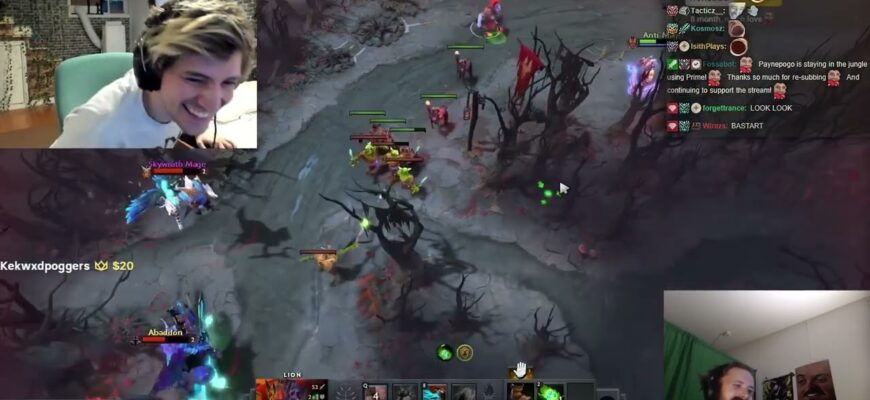Felix “xQc” Lengyel, a figure renowned for his high-octane streams and unapologetically direct commentary, recently aimed his analytical lens at the famously competitive world of Dota 2. His latest observations, specifically regarding his experiences navigating Russian game servers, have ignited a lively discussion across the global gaming community. It seems that even for a streamer well-versed in the digital gladiatorial arena, certain cultural nuances within online gaming communities can prove particularly striking, or perhaps, simply bewildering.
The Core Observation: A Single Misstep`s Cost
During a recent broadcast, xQc articulated his profound frustration with the perceived zero-tolerance policy prevalent on Russian Dota 2 servers. He painted a vivid picture where even a stellar performance could be instantly nullified by a solitary error.
“Bro, Russian servers are something else. You can go 30-0, but if you die once, it`s over. Mental explosion, racial slurs from everyone for no reason. It`s just insane.”
xQc`s account underscored a stark contrast between typical gaming expectations and the intense, unforgiving atmosphere he encountered. It`s a digital landscape where the pursuit of perfection appears to be the only acceptable state, and deviation is met with immediate, unsparing critique.
“They Hate Everything”: A Culture of Perpetual Scrutiny?
Perhaps the most striking of xQc`s remarks was his characterization of these players:
“It seems these guys don`t know how to smile at all, and don`t know what it`s like to have a good time. They hate everything.”
While delivered with characteristic xQc flair, this statement peels back a layer of the common gaming mantra of “fun.” For many, competitive games are indeed about winning, but often, there`s an underlying expectation of sportsmanship or, at the very least, a degree of tolerance for human error. xQc`s experience suggests that on these particular servers, the pursuit of victory transcends all, leaving little room for levity, camaraderie, or simple forgiveness. One might wryly observe that if “having a good time” is defined by smiling, then perhaps some competitive environments have simply redefined “good time” as “absolute victory at all costs.”
Beyond Regional Borders: The Anatomy of Online Toxicity
xQc`s insights aren`t merely about one specific region; they illuminate a broader phenomenon within online gaming: the varied landscape of community culture and the ever-present specter of toxicity. While every online game, especially high-stakes competitive titles like Dota 2, grapples with player behavior, xQc`s account highlights how deeply ingrained these social dynamics can be within specific geographic or linguistic communities.
Is it a cultural difference in how competitiveness is expressed? Is the anonymity of the internet simply amplified in certain contexts, enabling behaviors that would be unthinkable in face-to-face interactions? Or is it a reflection of the intense, almost professional-level dedication many players bring to their ranked matches, where any perceived weakness is seen as a direct impediment to their collective goal? The answer is likely a complex interplay of these factors, a digital tapestry woven from individual temperament, cultural norms, and the intoxicating allure of virtual victory.
The Streamer`s Unique Vantage Point
As a prominent streamer, xQc navigates a multitude of gaming environments and interacts with diverse fan bases. His prior musings on the competitive hierarchy, such as his take that League of Legends is “too simple and for kids” compared to Dota 2, demonstrate his deep engagement with the nuances of MOBA mechanics and player skill. This background lends significant weight to his observations; he isn`t a novice to challenging game communities, nor is he unfamiliar with the sting of online criticism. Yet, the specific intensity he described on Russian Dota 2 servers evidently presented a new level of online interaction for him, a stark revelation even for a seasoned veteran of digital warfare.
Implications for the Digital Arena
Such firsthand accounts from high-profile figures like xQc serve as potent reminders for game developers and community managers. When the threshold for abuse is set so low that a single mistake invites a “mental explosion” and racial slurs, it raises critical questions about accessibility, player retention, and the overall health of a game`s ecosystem. A truly global game faces the intricate challenge of fostering a common standard of conduct while respecting regional differences, a task often as complex and demanding as the game`s own intricate code. How does one cultivate a welcoming environment for newcomers when the established community appears to operate under a strict, unforgiving code of conduct?
Conclusion: A Call for Digital Empathy (or at Least, Patience)
xQc`s candid remarks about Russian Dota 2 servers provide more than just an amusing anecdote; they offer a valuable window into the varied and sometimes harsh realities of online competitive gaming. While the quest for digital glory can be exhilarating, perhaps a moment of reflection on the human element—the occasional misclick, the learning curve, or simply the desire to “have a good time”—could bridge the gap between perfection and mere participation. After all, even the most legendary plays often begin with an unexpected turn, and sometimes, the best strategy involves not just tactical brilliance, but also a touch of patience. Or, as xQc might wryly suggest, perhaps just a hint of a smile, even when your teammate just fed.









